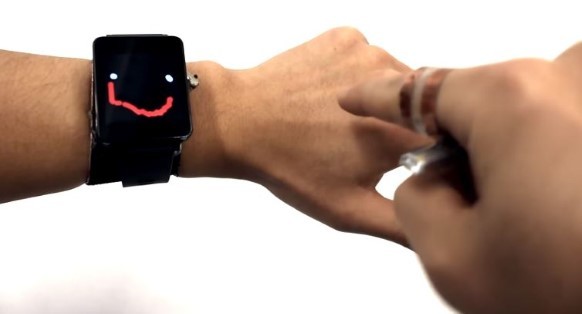Smartwatches have tiny screens that can make navigating the user interface hard to do. Enter SkinTrack, which is a possible solution to the problem for the age of wearable technology.
SkinTrack uses the user's own skin like an extended touch screen surface. The user's whole forearm can be the smartwatch's whole interface.
Future Interfaces Group has hatched the idea for the new technology. Researchers at the Carnegie Mellon University have managed to make a working prototype of their idea.
The wearer of the smartwatch needs to wear a small ring that sends the electrical signal through the skin which is then picked up by the smartwatch's sensors. It allows the user to draw gestures, touch buttons, swipe through the interface and more.
Using the sensors, the smartwatch triangulates the source of the electrical signal in real time. A video from the researchers show that there is a slight delay in the input, but the whole feat is still amazing to see.
The researchers even tested SkinTrack by playing Angry Birds, according to Digital Trends. Maybe the only thing missing is a holographic interface extension that would make the experience easier than before.
SkinTrack can also do continuous tracking on the skin. This allows users to doodle and to draw gestures on a wider surface compared to the screens of their smartwatches.
Other applications include app navigation and discrete button support. If the screen on the smartwatch is too small to dial a number or to input short text, the technology can allow the user to do so on the top of their hand or on their forearm.
Yang Zhang from CMU said that SkinTrack technology is not obtrusive, according to The Verge. Rings and watches are worn by the average person without having to attract much attention from onlookers.
The researchers said: "The technology is safe. No evidence suggests that the radio frequency signals used by SkinTrack have any health effects."
Further testing and research might be needed to move the technology forward. The researchers have not yet announced any plans to commercialize the technology for consumer electronics application.
SkinTrack could have the potential to increase the users of smartwatches. However, consumers will have to wait until the final version of the technology is launched for commercialization.


